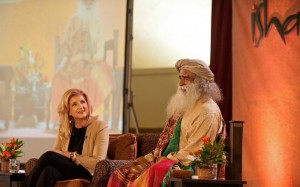In today’s world, anyone equipped with access to the internet’s public platforms and basic technological knowledge has the tools to make their voice heard on a mass scale.
Not only is this widespread sharing of thoughts, ideas, images and ideologies possible, it’s popular, and becoming more-so every day.
Roughly 1 in ten online adults maintain a personal online journal or blog, according to a Pew Internet survey. In addition, around 73% of online adults reported using a social networking site of some kind, and 42% use multiple social networking sites.
But how important is it for all voices to be heard?
 During a conversation event at Isha Institute’s World Peace Day celebration, Sadhguru and online media leader Arianna Huffington discussed topics ranging from leadership and peace to individual wellbeing and global transformation. They also responded to audience questions, which included the above query.
During a conversation event at Isha Institute’s World Peace Day celebration, Sadhguru and online media leader Arianna Huffington discussed topics ranging from leadership and peace to individual wellbeing and global transformation. They also responded to audience questions, which included the above query.
Clearly, as Huffington replied, “self-expression has become a huge source of fulfillment, entertainment for people.” But more than simply seeking amusement through their sharing, she notes that “people want to be part of the story of their times.”
The World is Watching
Unfortunately, for many of the world’s new social media sharers, the story of their times is turning into a violent tale, from local unrest and dissatisfaction, to demonstration and protesting, to full-blown uprisings and war. Occupy Wall Street, Egypt’s Arab Spring, Syria’s ongoing civil war, Turkey’s Taksim Square Protests, and the currently escalating protests in Venezuela and Ukraine — At another time in history, these movements might have passed relatively unnoticed or drawn only local attention. Today, however, the conflicts play out on a world stage, plastered across the web through Twitter’s trending hashtags and live updates, viral videos, and shocking images. In many cases, suppression methods employed against traditional media platforms have further spurred protesters to adopt social media as the only reliable outlets to spread their message.
The Technology to Empower
Paradoxically, the same technology that illuminates our disagreements and divisions also strengthens our connections and brings us closer together. Technology simply empowers us, giving us both a voice and a choice to share our stories or slogans, our ideas or anger, our struggles or successes, our hatred or our love.
Read more from Sadhguru:
“It is very significant that a time is coming where every human being on the planet will have a voice. If he has a clear voice, he will be heard across the world.
It’s a very significant technological process, particularly that we have chosen democratic ways of forming governments in the world. We need to understand democracy is not a spectator sport, it is an active participatory sport. Most human beings, or most citizens, are still not realizing this. I was just reading a report on how the previous election in the United States was won mainly on social media. And it’s beginning to happen in India, that right now all political leaders are on social media, all political leaders are having Facebook pages, all political leaders are tweeting on a daily basis very actively in India, because India has the most youthful population and everybody is beginning to have access to internet.
Especially that we have become democracies, it’s very important that everybody should have an opportunity to speak and a platform to speak. If their voice is clear enough, it will be heard. If it is just something, it will be lost, which is a fair ground. You don’t have to be a reputed journalist to write or to speak. If you have something to say that’s worthwhile for people around you, it can be said, and it can be heard, which is a phenomenal thing. Never before in the history of humanity such a thing has happened.” – Sadhguru
Watch more as Arianna Huffington and Sadhguru discuss technology and empowerment:







